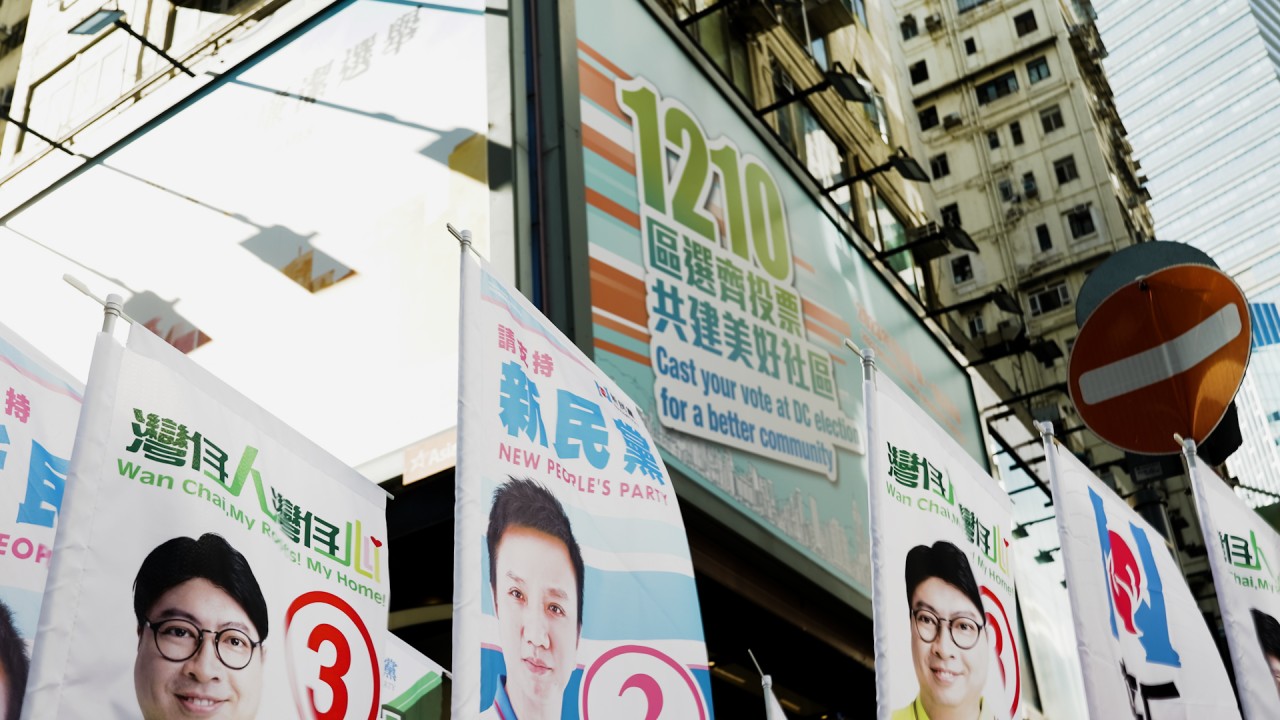
Hong Kong district council election: can the ‘patriotic’ winners deliver on Beijing’s expectations and be an effective bridge between government and people?
- Councillors’ performance will affect people’s confidence in an electoral system overhauled at the behest of the central government, observers say
- Beijing’s top office overseeing Hong Kong affairs has laid down five expectations for those elected
They warned that their performance in the 18 district councils starting next year would not only shape the internal dynamics of the pro-Beijing camp, but also affect people’s confidence in an electoral system overhauled at the behest of the central government.
Sunday’s poll registered the lowest turnout by a sizeable margin since Hong Kong’s return to Chinese rule in 1997, with the previous low standing at 35.8 per cent in 1999. The figure in the last poll held at the height of anti-government protests in 2019 was 71.2 per cent.
Winning councillors needed to put more effort into implementing the “one country, two systems” governing principle, resolve conflicts, do practical things for residents, unite society and fulfil their duties, according to the State Council’s Hong Kong and Macau Affairs Office.
Hong Kong’s main parties big winners in ‘patriots-only’ district council poll
The office stipulated that the revamped 18 district councils should actively advise and help the administration by “listening to people’s voices”, “resolving people’s concerns”, and “become a link between the government and the grass-roots people”.
“The district councillors must focus on the issues that residents are mostly concerned about and spend great efforts to solve them. Do something good and practical, something residents can see and feel, to win their recognition and support,” it said.
Observers said that although the poll was a race without opposition rivals, it would be tough for the 470 patriotic winners, including those to be appointed by the government, to deliver results amid infighting within the camp, deepening political polarisation and voter apathy.
Emeritus professor John Burns, who specialises in public administration at the University of Hong Kong, said a key issue for them would be their effectiveness as a link between the government and the communities they were to serve.
This was especially the case for the winners who were known to the non-voting public as those who lost in the 2019 poll.
“Will the newly appointed, small-circle elected, and publicly elected patriots-only councillors canvass opinion widely in their districts?” he asked.
“The government depends on the public, not just the official patriots, to implement policy … An alienated public will cooperate grudgingly or not at all.”
Hong Kong’s first ‘patriots-only’ district poll is ‘real, functioning democracy’
Burns said it was simply “face-saving” for Beijing to praise the “success” of the election, warning officials not to mistake the result as a sign of “public endorsement”.
He added that from Beijing’s perspective, the low turnout might be a reflection of the weak mobilisation capacity of the local government, which needed to be improved.
Jean-Pierre Cabestan, emeritus professor of political science at Baptist University, said the low turnout underscored the poll’s “lack of democratic legitimacy”.
“Success for Beijing is holding this parody of democracy and [declaring] loudly that it was democratic,” he said.
“What are the authorities’ options? To say it was a disaster? No way, you claim success even if everyone knows it was not.”
Will Beijing be happy with turnout for Hong Kong district council election?
But Lau Siu-kai, a consultant for semi-official Beijing think tank the Chinese Association of Hong Kong and Macau Studies, argued that residents had always been lukewarm towards district council elections except in 2019, and the voting rate was “not bad” as opposition supporters had boycotted the poll, as widely expected.
“It is quite acceptable with over 27 per cent turnout,” he said.
“The central government has a clear and pragmatic understanding of the turnout, and will not blindly believe that it can push it to a higher level through large-scale mobilisation and propaganda by the government and patriotic forces.”
Beijing would now focus on assessing if the new councillors were dedicated to settling district problems for residents, winning the support of Hongkongers and producing results, the veteran political commentator said.
“Since many seats are now being directly appointed by the chief executive and district committee members, the councillors’ actual performance will affect whether they will be reappointed in the next term,” Lau said.
“The central government will also pay attention to that.”
As it happened: Hong Kong district council poll ends after 1½-hour extension
The completion of Sunday’s election marked a full makeover of all levels of the electoral system, as the Legco and chief executive elections were revamped after China’s top legislature decided in March 2021 to overhaul the city’s politics in the wake of the 2019 social unrest.
Under the district council revamp, only 88 out of 470 seats are directly elected by the public. The city leader chooses 179 others, local committees decide another 176 and rural leaders will hold the remaining 27 seats.
Luo Weijian, director of the University of Macau’s Centre for Constitutional Law and Basic Law Studies, said the winners’ ability to “respond to the needs of the people with action” would be key to prove the effectiveness of the overhauled district councils despite the record-low turnout.
“The election is the ‘first mile’ instead of the ‘last mile’ of the system overhaul. People need to see real results, feel the real engagement before casting a vote of confidence in the system,” he said.
“This will very much rely on concrete actions by these new representatives in the districts, rather than senior officials’ narratives.”



